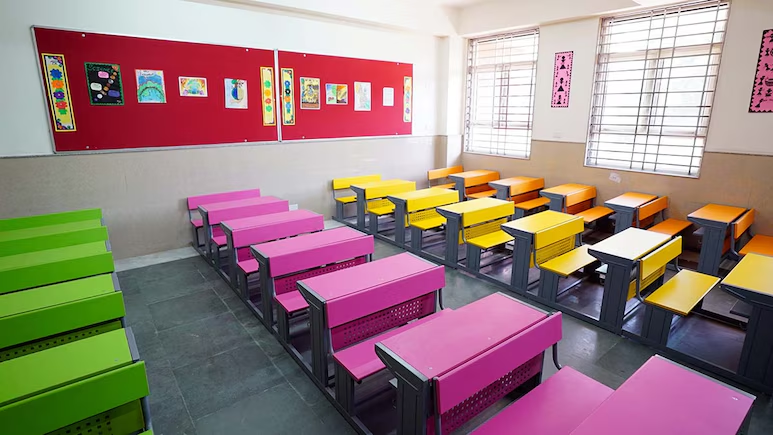
Amid outrage and protests over the changes, the CBSE said the reduction or “rationalization” of syllabus for classes 9 to 12 had been "interpreted differently" and that it was a “one-time measure” to reduce the exam stress of students due to the health emergency and to prevent learning gaps.
The national education board was responding to criticism it faced after key chapters like Democratic Rights, Food Security in India, Federalism, Citizenship and Secularism have been dropped from school courses to reduce the burden on students amid the coronavirus crisis.
The Central Board of Secondary Education (CBSE) announced on Tuesday that the syllabus for 2020-21 would be reduced by a third because of the "extraordinary situation" as the world fights the coronavirus pandemic.
The board has on Wednesday clarified that no question will be asked from the reduced syllabus in the Board Exams 20-21 only.
"The schools have also been directed to follow the Alternative Academic Calendar prepared by NCERT for transacting the curriculum. Therefore, each of the topics that have been wrongly mentioned in media as deleted have been covered under Alternative Academic Calendar of NCERT which is already in force for all the affiliated schools of the Board,” the CBSE said in a statement.
The Board reiterated that the topics being mentioned “as dropped are either being covered by the rationalized syllabus or in the Alternative Academic Calendar of NCERT”.
Bengal Chief Minister Mamata Banerjee has said she is "shocked" by the decision to drop subjects like democratic rights, federalism and secularism from the Economics and Political Science syllabuses of Classes 9 to 12 in all CBSE-affiliated schools.
Ms Banerjee said she "strongly object(ed)" to the move, which was announced yesterday by the education ministry on account of the "extraordinary situation in India" - a reference to the COVID-19 pandemic that has seen schools shut for over two months.
"Shocked to know that the central government has dropped topics like citizenship, federalism, secularism and partition in the name of reducing CBSE course during the COVID-19 crisis," Mamata Banerjee tweeted Wednesday.
The academicians also claimed that it appears more importance was given to "political considerations" than academics in reducing the syllabus.
"On the face of it, it appears that there is some ideological element in the choice of what is deleted. How do you optimise learning during this time? You are trying to reduce the investment in education, you are compromising on the learning of students," Professor at the Jawaharlal Nehru University's School of Social Sciences Surajit Majumdar told PTI.
"Reduction does not have to be because of the pandemic but for optimisation of learning," Prof Majumdar said.
Rajesh Jha, a political science professor at the Delhi University (DU), said when the choice-based credit system was introduced in varsity, the paper on nationalism and colonialism, which was earlier compulsory was made optional in 2017.
"Now, it has also happened to school syllabus. Unfortunately, political considerations have taken over academics. This will only affect academic rigour and quality. The concepts of liberty, equality, social justice, secularism are linked. How can one be taught without other?" he said.
(With PTI Inputs)
